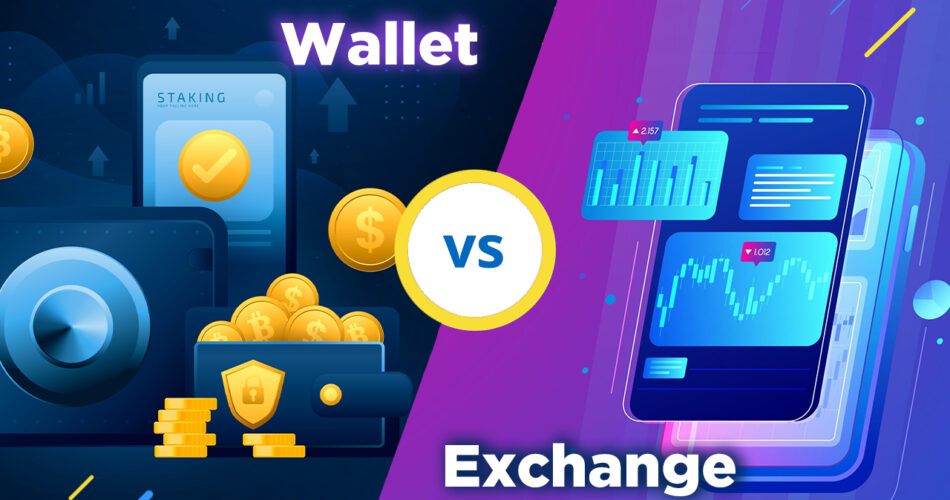In the rapidly growing world of cryptocurrency, one of the most important decisions you’ll face is where to store and manage your digital assets. The choice often comes down to a “Crypto Wallet vs Exchange” dilemma. Both options offer unique advantages and trade-offs, making it essential to understand their differences and how they align with your investment goals. In this article, we’ll explore the key features of crypto wallets and exchanges, helping you make an informed decision on where to store, hold, and trade your cryptocurrency.
Table of Contents
Understanding Cryptocurrency Wallets
Definition of a Cryptocurrency Wallet
A cryptocurrency wallet is a digital tool that allows you to store, send, and receive cryptocurrencies like Bitcoin and Ethereum. It works by using a pair of cryptographic keys: a public key, which is used to receive funds, and a private key, which is used to sign transactions and access your funds.
Types of Crypto Wallets
There are several types of crypto wallets available, each with its own advantages and disadvantages:
| Type | Description | Pros | Cons |
|---|---|---|---|
| Hardware Wallets | Physical devices that store your private keys offline | High security, immune to online hacks | Cost money, not as convenient for frequent trading |
| Software Wallets | Apps or software installed on your computer or smartphone | Convenient for frequent trading, free | Vulnerable to malware and hacks |
| Paper Wallets | Physical documents with your public and private keys printed on them | High security, immune to online hacks | Can be lost or damaged, not convenient for frequent trading |
Reliable Crypto Wallets
| Digital Wallet | Key Features | Link |
|---|---|---|
| Trezor Model T | High security, supports 14 cryptocurrencies, open-source software | Trezor Model T |
| Ledger Nano X | Secure cold storage, connects via Bluetooth or USB, supports over 5,500 cryptocurrencies | Ledger Nano X |
| Electrum | Customizable transaction fees, high security, only works for Bitcoin | Electrum |
| Exodus | Built-in exchange, good for beginners, supports cold storage | Exodus |
| MetaMask | A crypto wallet & gateway to blockchain apps, supports token exchange | MetaMask |
| Trust Wallet | Supports a wide range of tokens, built-in exchange, secure and private | Trust Wallet |
| Coinbase Wallet | Supports a wide range of tokens, secure and private, integrates with Coinbase | Coinbase Wallet |
| Tangem Wallet | Card-shaped self-custodial cold wallet, supports 6000+ coins and tokens | Tangem Wallet |
Understanding Cryptocurrency Exchanges
Definition of a Cryptocurrency Exchange
A cryptocurrency exchange is a platform that allows you to buy, sell, and trade cryptocurrencies. Exchanges can be centralized, where a third party controls the platform, or decentralized, where trading occurs directly between users.
Types of Crypto Exchanges
There are two main types of crypto exchanges:
| Type | Description | Pros | Cons |
|---|---|---|---|
| Centralized Exchanges (CEX) | Platforms controlled by a third party | High liquidity, user-friendly interfaces | Vulnerable to hacks, less privacy |
| Decentralized Exchanges (DEX) | Platforms where trading occurs directly between users | More privacy, no single point of failure | Lower liquidity, less user-friendly |
Reliable Exchanges
| Platform | Pros | Cons |
|---|---|---|
| MEXC | User-friendly interface, wide range of cryptocurrencies, lowest crypto exchange fees, advanced trading features | Platform may be complex for beginners, slow customer service response times |
| Binance | Large number of cryptocurrencies, advanced trading features, high liquidity, user-friendly interface | Reports of delayed customer service responses, potential target for hackers |
| Gate.io | Wide range of cryptocurrencies, advanced trading features, user-friendly interface, educational resources for beginners | Higher trading fees, does not support fiat currency deposits or withdrawals |
| OKX | Large number of cryptocurrencies, advanced trading features, competitive fees, user-friendly interface, educational resources for beginners | Reports of account freezes without prior notice, slow customer service response times |
| BingX | Advanced trading features, high leverage, ability to copy trades from successful traders, user-friendly interface | Smaller selection of cryptocurrencies, less liquidity due to smaller user base |
Comparing Crypto Wallets vs Exchanges
| Criteria | Crypto Wallets | Crypto Exchanges |
|---|---|---|
| Definition | Digital tools that allow users to store, send, and receive cryptocurrencies. | Platforms that allow users to buy, sell, and trade cryptocurrencies. |
| Types | Hardware Wallets, Software Wallets, Paper Wallets | Centralized Exchanges (CEX), Decentralized Exchanges (DEX) |
| Security | Pros: – Private keys are stored offline (hardware wallets) or under user control (software wallets). – Immune to exchange hacks. Cons: – Users are responsible for their own security. – Vulnerable to physical theft or loss (hardware and paper wallets). – Vulnerable to malware and hacks (software wallets). | Pros: – User-friendly security features (e.g., two-factor authentication). – No need to manage private keys. Cons: – Vulnerable to platform-wide hacks. – Custodial nature means users don’t have full control over their funds. |
| Accessibility | Pros: – Easy access to funds for sending and receiving. – Can be used with decentralized applications (dApps). Cons: – Not as convenient for frequent trading. – May require additional steps to access funds (hardware wallets). | Pros: – User-friendly interfaces for trading. – Access to a wide range of cryptocurrencies. Cons: – May have downtime or maintenance periods. – May impose withdrawal limits. |
| Costs | Pros: – No trading fees. – No withdrawal fees. Cons: – Network transaction fees apply. – Initial cost for hardware wallets. | Pros: – Access to liquidity and market orders. Cons: – Trading fees apply. – Withdrawal fees may apply. |
| User Experience | Pros: – Full control over funds. – Privacy (no need to provide personal information). Cons: – Responsibility for security. – May have steeper learning curve for beginners. | Pros: – User-friendly interfaces. – Customer support available. Cons: – Less privacy (requires personal information for account verification). – Custodial nature means less control over funds. |
| Liquidity | Pros: – Not applicable (liquidity is not a factor for wallets). Cons: – Not suitable for active trading. | Pros: – High liquidity for popular cryptocurrencies. – Access to market orders and trading pairs. Cons: – Liquidity may vary depending on the exchange and trading pair. |
| Best For | Long-term holders, users who prioritize security and privacy, users who interact with dApps. | Active traders and miners, users who prioritize convenience and ease of use, users who trade multiple cryptocurrencies. |
This comparison chart provides a detailed overview of the key differences, pros, and cons of crypto wallets and exchanges. It’s important to note that the choice between a crypto wallet and exchange depends on individual needs and preferences. Both options have their own advantages and trade-offs, so users should consider their investment goals, trading frequency, security preferences, and level of experience when making a decision.
Choosing the Right Option for You
Choosing between a crypto wallet and an exchange depends on your individual needs, preferences, and investment goals. Here are some factors to consider when making your decision:
Investment Goals
Are you planning to hold your cryptocurrency for the long term, or are you an active trader? If you’re a long-term holder, a crypto wallet may be a better option as it offers higher security and control over your funds. If you’re an active trader, an exchange may be more convenient as it provides easy access to trading and liquidity.
Frequency of Trading
How often do you plan to trade cryptocurrencies? If you trade frequently, an exchange may be more suitable as it offers a user-friendly interface and access to a wide range of cryptocurrencies. If you rarely trade and mainly hold your assets, a crypto wallet may be a better choice.
Security Preferences
How important is security to you? If you prioritize security and privacy, a crypto wallet may be a better option as it allows you to store your private keys offline or under your control. However, it also requires you to take responsibility for your own security. If you prefer a more user-friendly security experience, an exchange may be more suitable as it offers features like two-factor authentication and customer support.
Convenience and Ease of Use
Are you looking for a platform that is easy to use and convenient? If you prioritize convenience and ease of use, an exchange may be a better choice as it offers a user-friendly interface and customer support. If you’re willing to trade off some convenience for higher security and control, a crypto wallet may be a better option.
Access to Multiple Cryptocurrencies
Do you plan to trade multiple cryptocurrencies? If you want access to a wide range of cryptocurrencies and trading pairs, an exchange may be more suitable. If you only hold a few cryptocurrencies and don’t plan to trade frequently, a crypto wallet may be sufficient.
Costs
Are you willing to pay fees for trading and withdrawals? Exchanges typically charge fees for trading and withdrawals, while wallets may require an initial purchase (for hardware wallets) or network transaction fees. Consider the costs associated with each option and choose the one that aligns with your budget.
Experience Level
Are you a beginner or an experienced cryptocurrency user? If you’re a beginner, you may find an exchange more user-friendly and easier to navigate. If you’re experienced and comfortable with managing your own security, a crypto wallet may be a better choice.
Ultimately, the right option for you depends on your individual needs and preferences. Both crypto wallets and exchanges have their own advantages and trade-offs, so it’s important to consider your investment goals, trading frequency, security preferences, and level of experience when making your decision. Remember to do your own research and consider consulting with a financial advisor or cryptocurrency expert if you have any questions or concerns.
Conclusion
In conclusion, the choice between a crypto wallet and an exchange is a crucial decision for any cryptocurrency enthusiast. The “Crypto Wallet vs Exchange” debate boils down to your individual needs, preferences, and investment goals. If you prioritize security, privacy, and control over your funds, a crypto wallet may be the right choice for you. On the other hand, if you’re an active trader looking for convenience, ease of use, and access to a wide range of cryptocurrencies, an exchange may be more suitable. Both options have their own advantages and trade-offs, so it’s important to carefully consider your investment goals, trading frequency, security preferences, and level of experience when making your decision. Remember to do your own research, stay informed about the latest developments in the cryptocurrency space, and consider consulting with a financial advisor or cryptocurrency expert if you have any questions or concerns.
FAQs
Can I use both a crypto wallet and exchange?
Yes, many users choose to use both a wallet and exchange to enjoy the benefits of both options.


